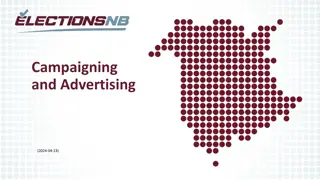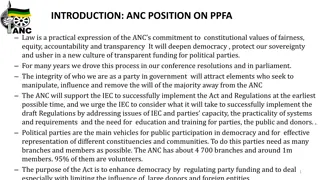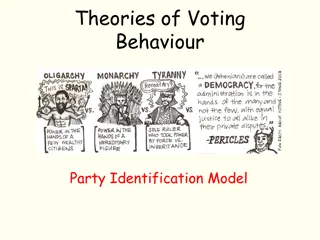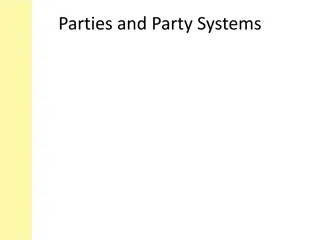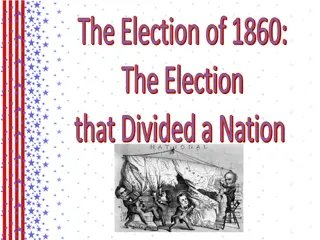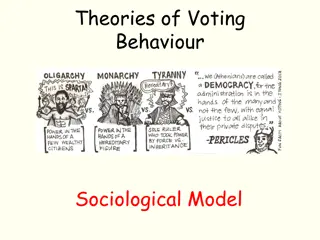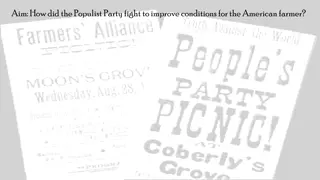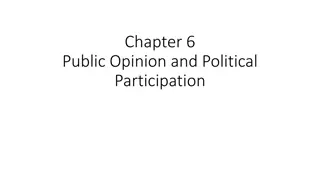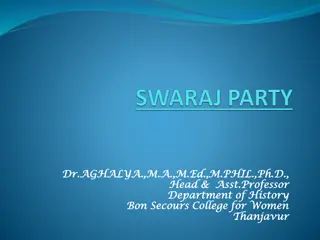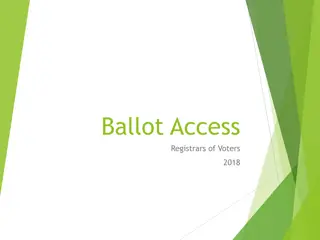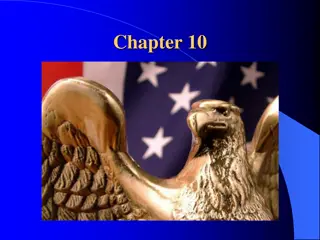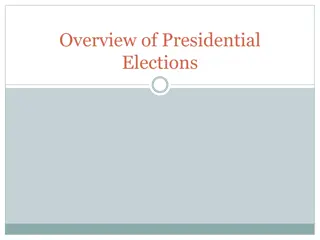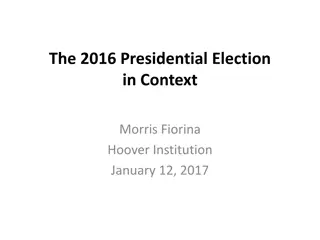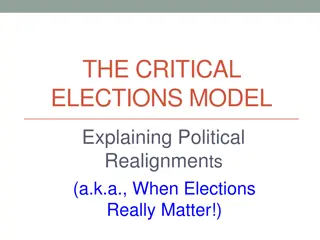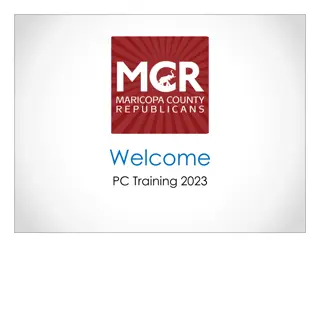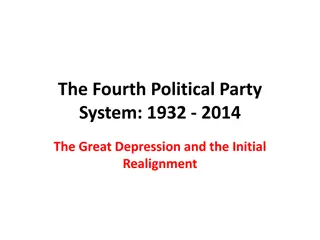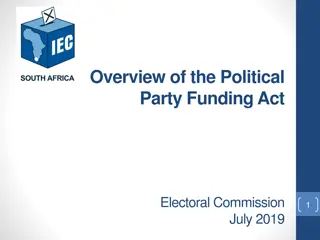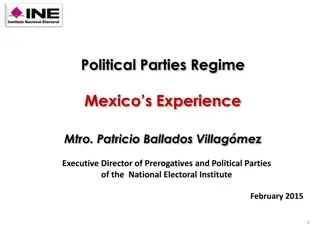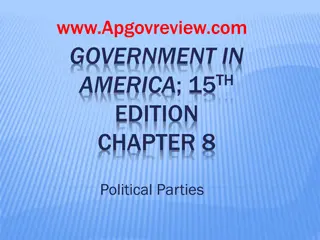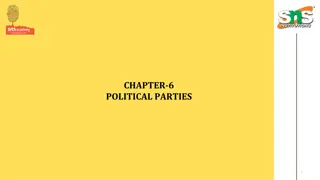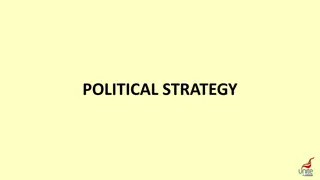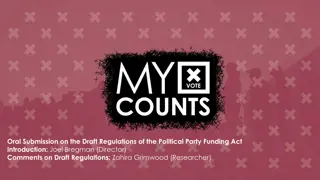Party Hire Online Singapore | Partyplus.com.sg
Looking for Party Hire Online in Singapore? Look at us at Partyplus.com.sg. Each party is unique and overflowing with fun, function, and one-of-a-kind memories. We always aim to create the perfect birthday party or event for each customer. Visit our site for more info.
6 views • 2 slides
Utah County Republican Party - Upcoming Events and Responsibilities
Stay informed about the Utah County Republican Party's upcoming events, including delegate training sessions, candidate meet-and-greets, and important party gatherings. Familiarize yourself with the party's constitution and bylaws, precinct officers' duties, and the role of precinct chairs in promot
1 views • 35 slides
Third-Party Contract Manufacturing Services
For companies looking for efficient manufacturing solutions, third-party manufacturers in India have a lot to offer. One of the leading third-party manufacturers in India is Unimarck Pharma. Contact us for full information about Third-Party Contract Manufacturing Services.
2 views • 4 slides
Roles and Responsibilities in Political Party Campaigning and Advertising
Roles and responsibilities in political party campaigning and advertising involve tasks such as soliciting contributions, coordinating fundraising activities, arranging financing, ensuring compliance with electoral budgets and spending limits, managing election expenses, maintaining accounting syste
2 views • 49 slides
Interdisciplinary Approach in Political Science and Its Relation with History
The need for an interdisciplinary approach in political science emerged in the 20th century to study political issues from various social science perspectives. This approach emphasizes the interrelation between political science and other disciplines like history. History provides the foundation for
0 views • 23 slides
Institutionalism and Methodological Issues in Political Science
Institutionalism is a foundational concept in political science, emphasizing the study of governing institutions and their role in shaping political behavior. It explores inductive and deductive approaches to research, highlighting the significance of empirical evidence and theoretical assumptions.
0 views • 19 slides
Understanding Gramsci's Political Theory and its Relevance Today
Gramsci's political theory, focusing on concepts such as hegemony, historical bloc, and the role of intellectuals, offers valuable insights into contemporary political challenges. Explored through the lenses of Prof. Ken Spours and Stuart Hall's analytical tradition, this analysis sheds light on Con
0 views • 13 slides
ANC Position on Political Party Funding Act
Practical insights on ANC's commitment to transparent political party funding, emphasizing the challenges and potential impact on donor behavior and party financing. The Act aims to regulate funding to enhance democracy, limit influence of large donors, and promote accountability.
0 views • 5 slides
Understanding Party Identification and Voter Bias in Voting Behavior Theories
Party identification theory posits that voters develop a psychological attachment to political parties, leading to long-term support independent of policies. Voter bias reflects individuals favoring their own party despite performance evaluations. These theories emphasize early socialization and cla
0 views • 11 slides
Understanding Party Systems in Comparative Politics
Parties in comparative politics play a crucial role in deepening democracy, connecting political society with the State, and maintaining accountability. The definition of a party can be categorized based on normative, motivational behavior, and operational perspectives. The development of party syst
0 views • 16 slides
The Election of 1860: A Divisive Campaign for the Future of the United States
The 1860 election was a significant moment in American history, marked by ideological divisions and the rise of Abraham Lincoln. The Republican Party, Southern Democratic Party, Democratic Party, Northern Democratic Party, and Constitutional Union all played crucial roles in shaping the outcome. The
1 views • 14 slides
Evolution of Citizenship in Liberal Democracy
Citizenship within liberal democracy entails equal rights, duties, liberties, and constraints for individuals within a political community. The entrenchment of civil and political rights has shaped the struggle for membership and participation in political communities. Civil rights, essential for in
1 views • 11 slides
Theories of Voting Behaviour and Sociological Models in Political Science
The analysis of voting behavior, also known as "psephology," delves into long-term influences like class and party loyalty, contrasting with more short-term factors such as political issues and media impact. While the Sociological Model focuses on class and party loyalties, there is a discrepancy be
0 views • 24 slides
The Populist Party's Fight for American Farmers
The Populist Party emerged as a champion for American farmers who were facing economic hardships such as low crop prices, increasing debt, and unfair railroad charges. Through the Grange organization, farmers demanded reforms like regulating railroads, implementing bimetallism, and advocating for po
1 views • 11 slides
Understanding Political Theory through a Contextual Approach
Exploring G.H. Sabine's perspective on political theory through a contextual approach, emphasizing the importance of historical context and societal influences. Sabine argues that while political theory evolves with its contemporary politics, it should be analyzed within its specific time and social
0 views • 9 slides
Understanding Public Opinion and Political Participation
Public opinion and political participation are influenced by various factors such as financial interests, family, education, and party identification. Measuring public opinion accurately through scientific surveys is crucial in a democracy. Traditional participation methods like voting and civic vol
5 views • 7 slides
The Swaraj Party: Formation, Background, and Aims
The Swaraj Party, a breakaway group from the Indian National Congress, was formed in 1923 by C.R. Das and Motilal Nehru following the withdrawal of the Non-Cooperation Movement. The party aimed for dominion status, autonomy, and self-rule, emphasizing control over bureaucracy and local bodies. The s
0 views • 12 slides
Understanding Ballot Access and Political Party Definitions for Elections
Learn about the definitions of key terms related to elections, such as caucus, convention, party-endorsed candidate, primary, district, municipal office, major party, minor party, state office, and endorsement. These definitions provide insight into the electoral process, including how candidates ar
0 views • 29 slides
Understanding Political Parties and Ideologies in the United States
Exploring the development and dynamics of political parties in the United States, this content delves into the definition of political parties, the two-party system, the political spectrum, major parties' differences, and the roles of Democrats and Republicans. It also touches upon third parties' ch
0 views • 18 slides
Evolution of American Party Systems: A Historical Overview
American party systems have evolved significantly over the centuries, from the Framers' Non-Partisan System to the New Deal Party System. Each era was characterized by different parties, ideologies, and voting trends, reflecting the changing sociopolitical landscape of the United States. From the co
0 views • 9 slides
Trends in U.S. Political Landscape: Polarization and Party Dynamics
The analysis delves into the evolution of the U.S. political scene, highlighting shifts in party majorities, polarization among liberals and conservatives, maintenance of moderate factions, the significance of independents, and the dominance of centrist issues. It explores the challenges posed by th
0 views • 37 slides
Understanding Critical Elections Model: Political Realignments
Critical Elections Model explains significant shifts in party loyalty and control of the political system. Historical examples like the 1860 and 1932 elections showcase lasting impacts on government structures due to key issues that divided parties. The model highlights the importance of national is
0 views • 12 slides
Become a Precinct Committeeman and Shape the Future of Your Political Party
A Precinct Committeeman (PC) plays a crucial role in voter registration and turnout on election days, making them a vital link between the community and the political party. By actively engaging with voters and building relationships in the precinct, PCs can influence voter turnout, candidate select
0 views • 58 slides
The Fourth Political Party System: 1932-2014 - The Great Depression and Economic Realignment
The Fourth Political Party System in the US, spanning from 1932 to 2014, was significantly influenced by the Great Depression. Factors like the boom in road construction, the housing industry, and the stock market bubble led to economic turmoil. Key figures like Herbert Hoover expressed optimism bef
0 views • 14 slides
Party-Based Euroscepticism in the Czech Republic
Analyzing the phenomenon of party-based Euroscepticism in the Czech Republic, this research delves into the Eurosceptic stances of various Czech political parties, their levels of Euroscepticism, and the implications of their positions. The study explores the context of party-based Euroscepticism wi
0 views • 25 slides
Political Development Theory and Practice: An Overview
Political development refers to the evolution of institutions forming the political power system of a society. Initially popular in the 60s-70s to describe political change, it later fell out of favor for being Euro-centric but has since regained significance. The concept encompasses aspects like po
0 views • 13 slides
Overview of Political Party Funding Act & Electoral Commission July 2019
South Africa has been addressing the issue of regulating private funding of political parties, with organizations like My Vote Counts advocating for transparency. Recent legal rulings have pushed for disclosure of funding sources, leading to the establishment of the Ad Hoc Committee on the Funding o
0 views • 16 slides
Political Party Funding Act 2018 Overview
The Political Party Funding Act of 2018 in South Africa aims to enhance multi-party democracy by regulating the funding and donations to political parties. It establishes the Multi-Party Democracy Fund funded by private sources, alongside the existing Represented Political Party Fund. The Act prohib
0 views • 17 slides
Evolution of Political Parties in Mexico: A Historical Overview
Mexico's political system transitioned from a hegemonic party structure to a pluralist system with increased electoral competition. The role of political parties, constitution reforms, and the evolution towards democratic participation are highlighted, reflecting the country's political development
0 views • 14 slides
The Impact of International Party Assistance: Objectives, Models, and Outcomes
Exploring the effects of International Party Assistance (IPA), this study delves into its objectives, organizational models, and financial scales. The key goals include promoting democratic consolidation, stable party systems, and viable political parties. Various modes of intervention, both direct
0 views • 16 slides
Understanding Political Party Funding Act of 2018
The Political Party Funding Act of 2018 regulates the funding of political parties in South Africa, ensuring equitable and proportional funding for parties participating in national and provincial legislatures. The Act defines various terms such as donations, foreign persons, and political parties,
0 views • 42 slides
Understanding Political Parties in America
Political parties in America play a crucial role in the electoral process, serving as linkage institutions between the public and government. They consist of party members in the electorate, organizational structures, and elected officials in government. The chapter delves into the meaning of politi
0 views • 12 slides
Explore the Fascinating World of Political Science
The Department of Political Science offers a range of courses, delving into topics such as political theory, international relations, and governance. Understand the distinction between politicians and political scientists, and explore branches of political science like public administration and huma
0 views • 16 slides
Evolution of Political Protests in Modern Russia: A Historical Overview
This article provides an in-depth analysis of the evolution of political protests in modern Russia from 1990 to present. It discusses the attitude of Russian journalists towards protests, basic concepts of political protest in modern political science, myths surrounding protests in Russia, and the f
0 views • 24 slides
Party Bus Rentals Elevate Your Celebration with American-Trans
\/\/ \/party-bus-rentals\nFind party bus rentals near your Blaine or Maple Grove party. Our skilled bus drivers are ready to help you get the party started wherever you want to go.\n
1 views • 3 slides
Impact of Political Stability on Equity Trading Costs of Cross-Listed Firms
The research explores the relationship between political stability and equity trading costs of cross-listed firms, highlighting the impact of political institutions, liquidity, and investor protection. It delves into the importance of factors like quality of political institutions, transparency, and
0 views • 24 slides
Interdisciplinary Relationships in Political Science
Political science and history share a symbiotic relationship, with history providing the foundation for political analysis while political science influences historical events. The contribution of economics to political science is evident in how economic conditions shape political ideologies and pol
0 views • 12 slides
Remedial Measures Implemented by Indian Political Party
Explore the impactful remedial measures taken by a prominent political party in India through a collage presentation. Delve into the functions of political parties, understanding partisanship, the necessity of political parties, and more. Gain insights into the significance and role of political par
0 views • 23 slides
Evolution of Trade Unions and the Labour Party: A Political Strategy Overview
The need for a Labour Party arose in the late 19th century as trade unions sought representation and protection against employers. This led to the formation of the Labour Representation Committee in 1900, evolving into the Labour Party. Over the years, a political strategy has been vital to ensure w
0 views • 10 slides
Oral Submission on Draft Regulations of Political Party Funding Act
Joel Bregman (Director) and Zahira Grimwood (Researcher) provide insights on the draft regulations of the Political Party Funding Act, focusing on general comments, specific regulations, and miscellaneous aspects like public education and accessibility. Suggestions are made to enhance transparency i
0 views • 14 slides



